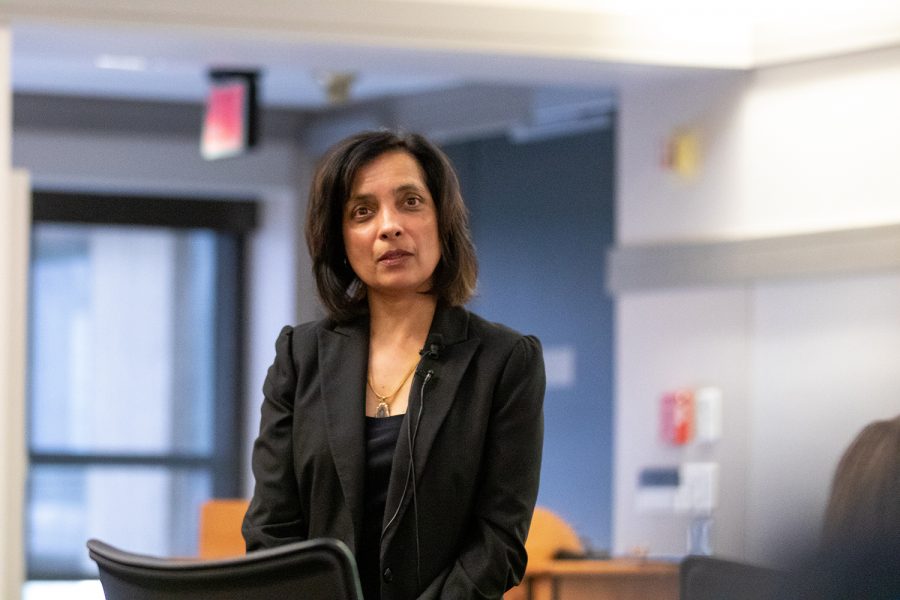Meenakshi Gigi Durham emerges as first candidate in UI associate VP search
Currently an administrator in the College of Liberal Arts & Sciences, Meenakshi Gigi Durham is the first candidate for the associate vice president for Diversity, Equity, and Inclusion role.
Meenakshi Gigi Durham, associate dean of the College of Liberal Arts & Sciences, responds to a question at the associate vice president for Diversity, Equity, and Inclusion forum in the Pappajohn Business Building on Thursday, March 7, 2019.
March 7, 2019
Meenakshi Gigi Durham, associate dean and diversity director for the University of Iowa College of Liberal Arts and Sciences, is already a familiar face among the campus community.
Students, staff, and faculty greeted Durham in the Pappajohn Business Building for a public forum on Thursday as the first candidate for a different role — that of associate vice president for Diversity, Equity, and Inclusion.
Since her arrival at the UI in 2000, Durham has held various roles, including associate dean for Outreach and Engagement in the liberal-arts school, as well as a professor of journalism and gender, women’s, and sexuality studies.
“I can’t believe that I’m standing here, because 18 years ago I came on this campus as a green associate professor,” Durham said. “And now here I am, a finalist for one of the key leadership roles here at the UI. It’s amazing.”
Durham’s presentation focused on answering the question of how she would foster the undergoing paradigm shift at the UI from not just initiatives oriented around diversity, but a strategic framework addressing diversity, equity, and inclusion.
She emphasized how a college campus is an important forum for discussion on real-life issues being dealt with worldwide, so questions from “out there” can be answered by students, faculty, and staff in a safe environment.
“One of the most wonderful things about being part of the university community is the many opportunities we have to think about these issues,” Durham said. “Changing a paradigm is a serious and significant event.”
Although it sounds like a simple change in terminology to add two words — Equity and Inclusion — to the title, Durham said, the shift actually marks the transformation of a perspective in reshaping how the UI campus sees itself and the world around it.
“This is a crucial move, and I am there,” Durham said. “I’m completely supportive of the directions it offers.”
The child of two Indian immigrants and the only student in her elementary class from a minority population, Durham reflected on how she has experienced racism from a very young age and thus been prepared for this position throughout her life.
“My family moved back to India when I was a teenager, and I found myself an outsider there in a different way,” Durham said. “It has given me a chance to think deeply about issues of identity.”
Durham said diversity and equity both address the differences that shape a student’s life, and they all learn differently. The issue of inclusion, she said, is quickly rising to the top as the most pressing issue for university administration, faculty, and staff.
“Flourishing in a university environment depends on a feeling that you belong there,” Durham said. “Because unless you have a feeling of safety, security, and support, you can’t achieve your highest potential.”
Women’s Resource and Action Center Associate Director Martha Pierce asked Durham how she would improve communication from campus administration.
“One of the things that our campus seems to be struggling with is how they engage students, faculty, and staff,” Pierce said.
RELATED: Shivers: UI focused on supporting underrepresented populations
Durham responded that a culture change is a slow process, and doesn’t happen without leadership from the top — better and more diverse communication between the administration, faculty, and staff will come from reaching people in a more thoughtful way.
Center for Diversity and Enrichment Assistant Director Nicholas Creary asked how Durham would address any pushback on campus against her initiatives. She answered his question by citing the campuswide diversity, equity, and action plan that requires concrete steps.
“I would imagine you’ll be getting an awful lot of resistance to the things you’re suggesting,” Creary said. “I would imagine that’s been the case for quite some time here.”







